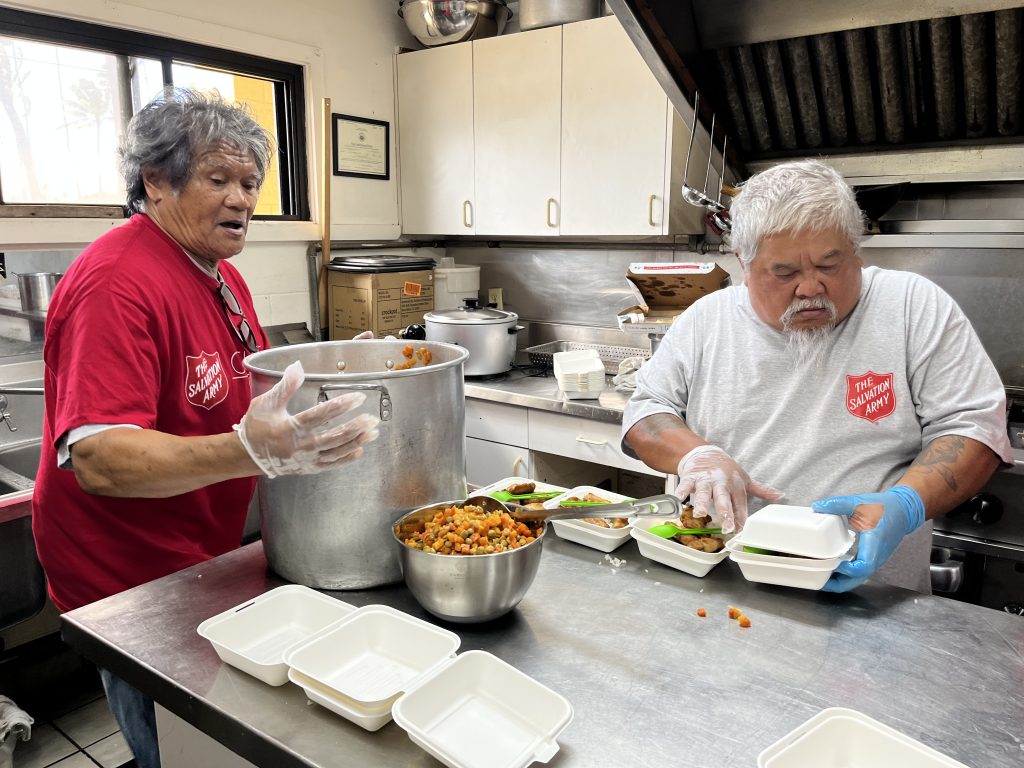Salvation Army enters recovery phase on Maui, continues food service at hotel shelters
As the needs of survivors of the Maui fires change, so does The Salvation Army’s service. Activated from the first moments of the Maui fires on Aug. 8, 2023, The Salvation Army prepared 26,284 meals and coordinated a total of 153,997 through local and nonprofit partnerships at 34 feeding locations during the initial phase of the relief effort, though feeding sites are now transitioning to non-congregate shelters at local hotels.
Here’s how The Salvation Army is currently involved in serving Maui residents:
Food Service – In collaboration with The American Red Cross on a Transitional Shelter Assistance program at area hotels, The Salvation Army will provide service to hotel residents with twice daily meals.
Emotional & Spiritual Care – Teams of trained Salvation Army staff members are on the island providing care and comfort during meal delivery. Emotional & Spiritual Care teams are also on call at the Family Assistance Center (FAC) and the Disaster Resource Center (DRC) providing The Salvation Army’s “ministry of presence.”
Unmet Needs Assistance – The Salvation Army is on site at FEMA’s Disaster Recovery Center (DRC) from 9AM to 5PM daily to help Maui residents who have registered for federal assistance with immediate financial help to purchase essential items.
FEMA Disaster Resource Center
University of Hawaiʻi Maui College
310 W. Kaʻahumanu, Kahului, Maui
“Our goal is to help our displaced Maui neighbors stabilize by providing them some of the comforts of home while they work to rebuild their lives with assistance from nonprofit and government agencies. This will be a long process and we will need many to join us in this significant recovery effort. The best way the public can help is to make a financial gift that allows us to deliver exactly what survivors need,” said Major Troy Trimmer, The Salvation Army’s Hawaiian and Pacific Islands Divisional Commander.
The Salvation Army is part of a team of agencies providing assistance during events and is a member of the State of Hawaiʻi Voluntary Organizations Active in Disaster.
Donations may be made online at Hawaii.SalvationArmy.org or text HAWAIIFIRE to 51555. Listings of current volunteer opportunities also may be found at Hawaii.SalvationArmy.org.
About The Salvation Army Disaster Services
The Salvation Army is uniquely positioned to serve those impacted by disasters, however long it takes, because they are there before, during, and after impact. Beyond serving immediate physical needs, they also meet the emotional and spiritual needs that are unique to catastrophic events. The Salvation Army:
- Delivers disaster relief to an average of 382,000 people annually.
- Serves every ZIP code in the United States and touches almost 25 million lives a year.
- Has served survivors of every major national disaster since 1900.
- Remains in communities until needs are met and beyond.
About The Salvation Army – Hawaiian & Pacific Islands Division
The Salvation Army – Hawaiian & Pacific Islands Division covers the state of Hawaiʻi and the Pacific Islands including Guam, Republic of the Marshall Islands and The Federated States of Micronesia.
The Division offers a wide variety of programs throughout the islands including: affordable senior housing; at-risk youth services and housing; camp and conference center; church/religious services and programs; emergency disaster services; family stores; food distribution and feeding programs; homeless services; The Kroc Center – Hawaiʻi’s largest community center; preschools and day care services; older adults; social services – emergency assistance; substance abuse treatment; women’s auxiliary; and women’s ministries.
For more information, call 808-988-2136, visit hawaii.salvationarmy.org.


















_1768613517521.webp)



